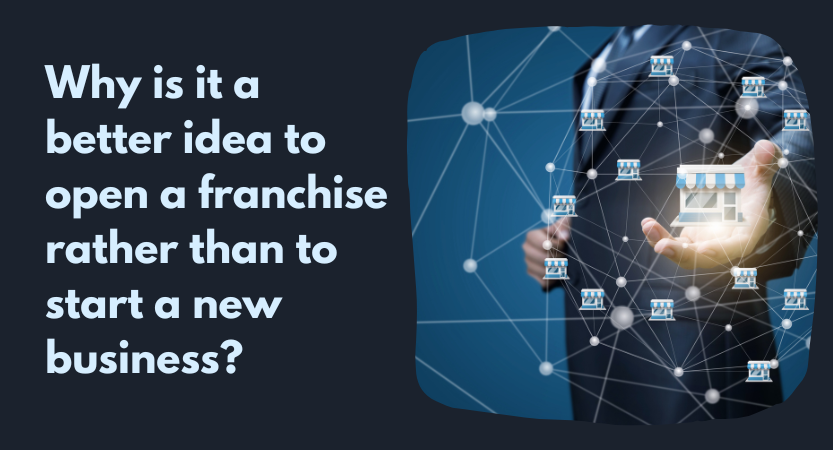Franchises have been shown to be more successful than start-up businesses. When you create a franchise, you have support from the very beginning. Compared to a franchise, a starting business entails far more risk. The franchise has a significantly smaller risk factor. By offering ongoing assistance to the franchises, franchisors seek to maintain their brand recognition when starting a franchise. The individual has a variety of possibilities when starting a business. It is possible to open an existing franchise or launch a brand-new startup firm. Decisions may be made in light of a number of variables. But starting a franchise is always a better and safer alternative. Franchising offers a quick and simple option to start a business if you are a detail-oriented owner who is skilled at following instructions and at ease with established systems. You can have the ideal balance of independence and guidance when you own a franchise.
The following are a few points to consider while choosing between a franchise and a start-up business:
Brand awareness:
While a new firm may not be able to garner brand equity, consumers are already aware of a franchise’s brand and its promise of dependability and quality. One of the biggest benefits of buying a franchise is that starting your business will cost you less money and time.
Even if your company is completely new to a region, the reputation of the franchise brand can provide the initial, highly important word-of-mouth advertising. Thus, the likelihood of success will be considerably higher.
Control:
In a start-up business, the owner can apply his own methods and management styles and have total authority over the enterprise, whereas in a franchise, the franchisor retains strategic control and the franchisees handle operational matters. In comparison to a starting business, the owner of a franchise needs less strategy.
Equipment and supplies:
When starting a business, the owner must arrange all the supplies that must adhere to strict quality standards and negotiate the best prices, whereas, in a franchise, all of these tasks are handled by the franchisor; you only need to invest the money; the franchisor will handle the rest of the labor-intensive tasks.
Financing:
The owner of a new business must put a significant amount of money into retail, office space, marketing, and equipment. Franchises, on the other hand, have an advantage because franchisors are more willing to lend money to an established brand than a new company.
Franchises can benefit from the franchisor’s potentially multi-million dollar national and regional marketing budgets. This could involve making a minimum monthly contribution that is much smaller than the rewards that could result. In the early stages of a business, more money will need to be spent on marketing and advertising, with no assurance of a return. With a franchise, you will also gain a devoted customer base in addition to a well-known brand. With the franchise’s name familiarity comes an initial sense of trust.
The franchise will also offer advice and assistance on how to create and carry out successful campaigns of your own. Depending on their size and resources, they could also offer you a marketing plan that includes a market study, strategy, sales projection, and budget to assist you in marketing the business.
Speed to market:
When starting a business, the owner must conduct thorough research and establish accurate estimates for all supplies, equipment, and office space needs. If these estimates are inaccurate, there could be a financial and business potential loss. And since a franchise is a copy of an existing business, all of the standards are already met, enabling the start of business activities in a relatively short amount of time.
Faster ROI:
The ROI for a franchise is higher than for a startup because it can take a while for a business to establish its clientele and brand. Failures that cost money, time, energy, and frustration will occur when you start your own firm from nothing, but in a franc
Support from franchisors:
By giving ongoing assistance to the franchises, franchisors frequently work to preserve the reputations of their brands. Additionally, field support professionals are supplied by franchisors to maintain business operations and develop owners as leaders. Any franchise carries significantly less risk than a start-up company does. Every firm must comply with a fairly large set of license requirements and rules before they can open for business. If your business is a franchise, your franchisor will provide you with substantial support and direction. You’ll get assistance from your franchisor to get over these obstacles.
The franchisee carries out the plan after receiving all the necessary items from the franchisor (including supplies, training, and equipment) to launch the firm. Purchasing a franchise provides new businesses with the perfect mix of independence and support.
Peer support:
With an established network of franchisees, the company owner can gain access to business expertise to address issues and obstacles. Franchises offer more peer support than a start-up company does.
Innovation in products or services: Any type of corporate innovation demands a significant time and financial commitment. A startup business may not always succeed, resulting in a loss of time and money, but franchisors continuously innovate on their own dime and, following trials and errors, put the new product on the market in franchisee stores.
Site selection:
Franchisors can aid in this process by bringing in site selection specialists with a wealth of knowledge in the field and by negotiating leases with landlords. All of these elements contribute to building the franchise business on the proper foundation.
Scalability:
The opportunity to grow a franchise is among the most popular benefits of doing so. A franchise system enables a business owner to grow his enterprise more successfully and efficiently as he sees fit.
An established business model is always the foundation of a franchise, and they are easily scalable in a variety of ways. Starting in one location and progressively extending to more locations as needed is a common way to geographically scale your firm.
Buying a franchise is usually preferable to starting a brand-new startup company. Compared to the owners of start-up companies, franchise owners have a higher chance of becoming successful business owners. Starting a new business from the beginning can be very challenging. Although opening a new business comes with a lot of responsibility, such as creating a solid company, investing in franchises has several benefits.
A successful company model that has already addressed its faults and is aware of its strong points supports you when you invest in a franchise. An established franchise will support you with effective marketing and advertising initiatives to assist you to draw in clients. You’re never on your own when you open a franchise; if you run into trouble, the franchisor will always be there to help. You have the freedom and flexibility to be your own boss in a franchise. Some franchisors also provide extensive training programs that can help you launch your firm and learn a lot about the sector. Franchisees frequently profit from the parent company’s combined purchasing power since it shares its savings with them. As a result, a franchise has lower inventory and supply costs than an independent business. There are numerous dangers involved with launching a business. You may rely on franchisors to assist you if you run into any operational problems. The owner can benefit greatly from training programs that include beneficial materials including reviews of store operations, sales, financial management, and day-to-day business operations.
The best investments nowadays are franchises of successful companies. According to statistics, a franchise has a much lower failure rate than a start-up company. It enables all ambitious business owners to launch a new company without taking on the same level of risk as a completely untested firm. The firm is already established, there is a support structure in place, and financing is easier, to name a few of the franchise’s primary benefits. When compared to a startup firm, investing in a franchise is more simple since it offers the chance to fund an already established, profitable business model that frequently has a good training program, a reliable supply chain, and knowledgeable technical support. Franchises that are profitable frequently have impressive success rates and lower failure rates. Franchises also offer a simple and transparent exit strategy. When you’re ready to retire as an owner, you sell an established, well-known franchise to another franchisee. Franchise investments are made because the business concept is successful and lucrative. It provides business owners with a reliable and tried approach to managing a flourishing enterprise.




